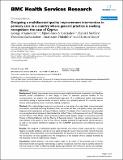| dc.contributor.author | Samoutis, George A | |
| dc.contributor.author | Soteriades, Elpidoforos S. | |
| dc.contributor.author | Stoffers, Henri E | |
| dc.contributor.author | Zachariadou, Theodora | |
| dc.contributor.author | Philalithis, Anastasios | |
| dc.contributor.author | Lionis, Christos | |
| dc.date.accessioned | 2010-11-08T21:01:07Z | |
| dc.date.issued | 2008 | |
| dc.identifier.citation | Samoutis, George A., Elpidoforos S. Soteriades, Henri E. Stoffers, Theodora Zachariadou, Anastasios Philalithis, and Christos Lionis. 2008. Designing a multifaceted quality improvement intervention in primary care in a country where general practice is seeking recognition: the case of Cyprus. BMC Health Services Research 8:181. | en_US |
| dc.identifier.issn | 1472-6963 | en_US |
| dc.identifier.uri | http://nrs.harvard.edu/urn-3:HUL.InstRepos:4551789 | |
| dc.description.abstract | Background: Quality Improvement Interventions require significant financial investments, and therefore demand careful consideration in their design in order to maximize potential benefits. In this correspondence we present the methodological approach of a multifaceted quality improvement intervention aiming to improve quality of care in primary care, properly tailored for a country such as Cyprus where general practice is currently seeking recognition. Methods: Our methodological approach was focused on the design of an open label, community-based intervention controlled trial using all patients from two urban and two rural public primary care centers diagnosed with hypertension and type II diabetes mellitus. The design of our intervention was grounded on a strong theoretical framework that included the Unified Theory of Acceptance and Use of Technology, and the Chronic Care Model, which synthesize evidence-based system changes in accordance with the Theory of Planned Behavior and the Theory of Reasoned Action. The primary outcome measure was improvement in the quality of care for two chronic diseases evaluated through specific clinical indicators, as well as the patient satisfaction assessed by the EUROPEP questionnaire and additional personal interviews. Results: We designed a multifaceted quality improvement intervention model, supported by a varying degree of scientific evidence, tailored to local needs and specific country characteristics. Overall, the main components of the intervention were the development and adoption of an electronic medical record and the introduction of clinical guidelines for the management of the targeted chronic diseases facilitated by the necessary model of organizational changes. Conclusion: Health planners and policy makers need to be aware of the potential use of certain theoretical models and applied methodology as well as inexpensive tools that may be suitably tailored to the local needs, in order to effectively design quality improvement interventions in primary care settings. | en_US |
| dc.language.iso | en_US | en_US |
| dc.publisher | BioMed Central | en_US |
| dc.relation.isversionof | doi:10.1186/1472-6963-8-181 | en_US |
| dc.relation.hasversion | http://www.ncbi.nlm.nih.gov/pmc/articles/PMC2529293/pdf/ | en_US |
| dash.license | LAA | |
| dc.title | Designing a Multifaceted Quality Improvement Intervention in Primary Care In a Country where General Practice Is Seeking Recognition: the Case of Cyprus | en_US |
| dc.type | Journal Article | en_US |
| dc.description.version | Version of Record | en_US |
| dc.relation.journal | BMC Health Services Research | en_US |
| dash.depositing.author | Soteriades, Elpidoforos S. | |
| dc.date.available | 2010-11-08T21:01:07Z | |
| dash.affiliation.other | SPH^Environmental+Occupational Medicine+Epi | en_US |
| dc.identifier.doi | 10.1186/1472-6963-8-181 | * |
| dash.contributor.affiliated | Soteriades, Elpidoforos | |


